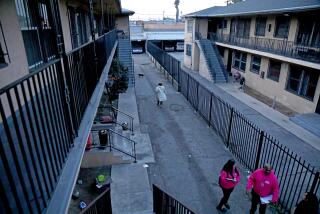Is Tenant Entitled to Punitive Damages?
- Share via
QUESTION: I’m a landlord who had a tenant move out without cleaning the unit, claiming it wasn’t worth his bother. I had a $500 security deposit from which I deducted $75 for general cleaning and $55 for carpet cleaning. I returned the balance of $370 to the tenant within 14 days. Now the tenant is suing me in small claims court not only for the remainder of the deposit, but for an extra $200 in punitive damages because he claims the entire deposit should have been returned within the 14-day period. I can prove through receipts that I actually incurred costs that were legally deductible and that I have not done anything dishonest, but if a judge sees otherwise, could my former tenant be entitled to the punitive damages too?
ANSWER: State law allows a judge to award up to $200 in punitive damages when the landlord shows bad faith in returning the security deposit. You initially sent the itemized statement and balance of the deposit back within the 14-day period, although there is a dispute about the $130 deduction. Frequently, there are disagreements between tenants and landlords about what deductions are reasonable and accurate, but it doesn’t necessarily mean the landlord withheld the money in bad faith. At this point, it is up to you to show the judge that you fairly assessed the unit and charged the tenant accordingly. The judge may find that the $130 was too much, but if you can show receipts for the deductions, it is unlikely that he will find any bad faith that would justify the award of punitive damages.
‘Emergency’ Required Prompt Attention
Q: I rent a small house that has a washer and a dryer in the attached garage. A few weekends ago, I was doing laundry and I noticed a large water-saturated area of the wall that separates the house from the garage. Immediately, I called the landlord and left a message on his answering machine.
After waiting several hours, I called my landlord and left another message. The wall was now starting to bubble, and because I thought it might cause damage inside the house, I called a plumber to come right away. The plumber was able to break a hole in the wall through the garage side and fix an old broken pipe. The plumber charged $239 for parts and labor, which I paid.
Now my landlord refuses to reimburse me the entire amount claiming that he could have had it done for much less. I feel that it was an emergency and I had no other choice, especially since I could not get in touch with him. Aren’t I entitled to get reimbursed for the entire cost of the repairs?
A: Most likely, yes. Except in the case of an emergency, a tenant has the obligation to not only notify the landlord of the needed repairs, but to also give him reasonable time to repair or remedy the situation before going ahead and having the work done. Though in most cases reasonable time is considered to be 30 days, your problem appeared to be an emergency that required prompt attention.
Explain to your landlord that although you could not reach him, you felt the situation represented a threat of seriously damaging his property and you had no choice but to call a repairman. If you still cannot resolve the disagreement, contact your local tenant/landlord mediation program for assistance.
If Not Specified, Rent Is Due at End of Term
Q: I own a small complex and recently lost an unlawful detainer action because my rental agreement does not specify when rent is due. I always assume that rent is due on the first of the month. Isn’t this correct? If not, what is the law regarding when rent is due?
A: According to Civil Code sec. 1947, if a rental agreement does not state when rent is due, rent is assumed to be due at the end of the rental period rather than in advance. Therefore, because your rental agreement did not specify that rent was due in advance on the first of the month, your tenants were not responsible for paying it until their rent term had ended. If you used a fixed-term lease and it did not state that rent was due monthly, you might have had to wait until the end of the lease to collect the rent.
You should strongly consider changing your rental agreement to specify when rent is due. You may want to amend your current month-to-month agreements by issuing a 30-day notice to change the terms of tenancy, but for a fixed-term lease, changes can’t be made before the lease expires, unless the tenants consent.
More to Read
Sign up for Essential California
The most important California stories and recommendations in your inbox every morning.
You may occasionally receive promotional content from the Los Angeles Times.






